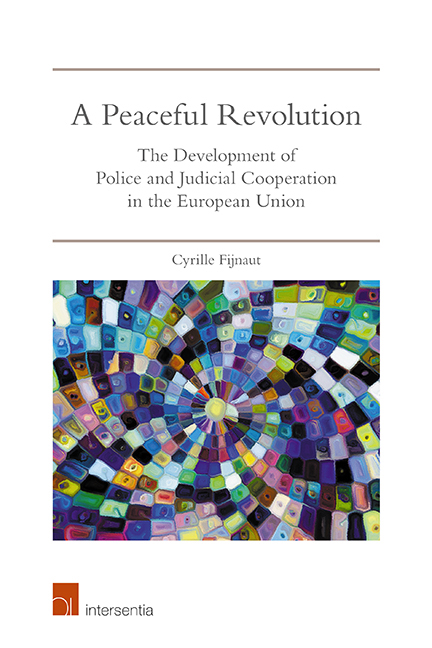Book contents
- Frontmatter
- Preface
- Contents
- List of Acronyms and Abbreviations
- Chapter 1 General Introduction
- PART I THE HISTORICAL BACKGROUND TO POLICE AND JUDICIAL COOPERATION IN THE EUROPEAN UNION
- PART II THE FOUNDATION OF POLICE AND JUDICIAL COOPERATION IN THE EUROPEAN UNION
- PART III THE CURRENT STATE OF POLICE AND JUDICIAL COOPERATION IN THE EUROPEAN UNION
- Chapter 7 The Treaty of Lisbon and the Stockholm Programme
- Chapter 8 The Treaty of Lisbon and the European Agenda on Security
- Chapter 9 General Conclusion
- Bibliography
- About the Author
Chapter 9 - General Conclusion
from PART III - THE CURRENT STATE OF POLICE AND JUDICIAL COOPERATION IN THE EUROPEAN UNION
Published online by Cambridge University Press: 09 November 2019
- Frontmatter
- Preface
- Contents
- List of Acronyms and Abbreviations
- Chapter 1 General Introduction
- PART I THE HISTORICAL BACKGROUND TO POLICE AND JUDICIAL COOPERATION IN THE EUROPEAN UNION
- PART II THE FOUNDATION OF POLICE AND JUDICIAL COOPERATION IN THE EUROPEAN UNION
- PART III THE CURRENT STATE OF POLICE AND JUDICIAL COOPERATION IN THE EUROPEAN UNION
- Chapter 7 The Treaty of Lisbon and the Stockholm Programme
- Chapter 8 The Treaty of Lisbon and the European Agenda on Security
- Chapter 9 General Conclusion
- Bibliography
- About the Author
Summary
The history of cross-border police cooperation dates back to the early nineteenth century. For various reasons, prior to the First World War the cooperation was not organised on a formal basis or – in contrast to the extradition of persons between two countries – by treaty. This was entirely connected with the fact that the cooperation during that period was generally concerned mainly with tackling political opposition or, more generally, political violence. Why? Because most European states at that time had a common interest in effectively controlling those problems. That is not to say that various societal changes – such as the growth of train and road traffic and the accompanying growth in ordinary crossborder crime – were not prompting discussion of ideas for more formal methods of organising cross-border police cooperation in order to improve the efficiency and effectiveness of the investigation of this type of crime.
At the start of the twentieth century there were even proposals that could easily be described as initial efforts to create the forms of intergovernmental cooperation that were ultimately realised in the Union. The suggestions included the establishment of an international police agency, the direct extradition of suspects, accused persons and convicted persons between the judicial authorities of different countries, and the creation of an international criminal records register. However, there was no intergovernmental or supranational political framework for implementing these proposals.
Nor was such a framework created in the aftermath of the First World War, with the result that the growing demand for systematic cross-border cooperation in the area of criminal investigation was ultimately met by the establishment of the Internationale Kriminalpolizeiliche Kommission in 1923. Although subsequent efforts were made to formally regulate police cooperation in a specific convention – through the League of Nations or otherwise – for various reasons, including major differences of opinion about the scope and substance of such a convention, they did not produce the hoped-for result. One of the insights gained from this important debate was that although there was a connection between police cooperation and judicial cooperation, their intrinsic differences meant that the two forms of cooperation had to be organised within different frameworks.
- Type
- Chapter
- Information
- A Peaceful RevolutionThe Development of Police and Judicial Cooperation in the European Union, pp. 719 - 728Publisher: IntersentiaPrint publication year: 2019



